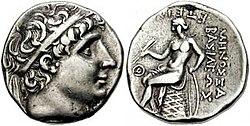 Coin of Antiochus I Soter. The reverse shows Apollo seated on an omphalos. Inscription reads ΒΑΣΙΛΕΩΣ ΑΝΤΙΟΧΟΥ (lit. 'of king Antiochus'). | |
| Romanization | basileus |
|---|---|
| Pronunciation | Ancient Greek: [basile͜ús], Modern Greek: [vasiˈlefs] |
| Language(s) | Greek |
| Origin | |
| Meaning | King, Emperor, Monarch |
| Region of origin | Ancient Greece |
Basileus (Ancient Greek: βασιλεύς)[a] is a Greek term and title that has signified various types of monarchs throughout history. In the English-speaking world it is perhaps most widely understood to mean 'monarch', referring to either a 'king' or an 'emperor'. The title was used by sovereigns and other persons of authority in ancient Greece (especially during the Hellenistic period), the Byzantine emperors, and the kings of modern Greece. The name Basileios (Basil), deriving from the term basileus, is a common given name in the Eastern Orthodox Church and Eastern Catholic Churches.[1]
The feminine forms are basileia (βασίλεια),[2] basilissa (βασίλισσα), basillis (βασιλίς), or the archaic basilinna (βασιλίννα), meaning 'queen' or 'empress'.[3] The related term basileia (βασιλεία) has meanings such as 'sovereignty', 'royalty', 'kingdom', 'reign', 'dominion' and 'authority'.[4][5]
Cite error: There are <ref group=lower-alpha> tags or {{efn}} templates on this page, but the references will not show without a {{reflist|group=lower-alpha}} template or {{notelist}} template (see the help page).
- ^ "www.synaxaristis - ΜΕΓΑΣ ΣΥΝΑΞΑΡΙΣΤΗΣ". www.synaxarion.gr. Retrieved 2024-06-27.
- ^ Faculty of Classics, University of Cambridge; Diggle, James (2021-04-22). The Cambridge Greek Lexicon (1 ed.). Cambridge University Press. p. 275. doi:10.1017/9781139050043. ISBN 978-1-139-05004-3.
Od. A. Hdt. E. Pl. AR. Plu (sc. Odyssey; Aeschylus; Herodotus; Euripides; Plato; Apollonius Rhodius; Plutarch)
- ^ Brown, Roland Wilbur (1956). Composition of Scientific Words: A Manual of Methods and a Lexicon of Materials for the Practice of Logotechnics. Smithsonian Institution Press. ISBN 9780874742862.
- ^ Faculty of Classics, University of Cambridge; Diggle, James (2021-04-22). The Cambridge Greek Lexicon (1 ed.). Cambridge University Press. p. 274. doi:10.1017/9781139050043. ISBN 978-1-139-05004-3.
- ^ "βασιλεία". billmounce.com. Retrieved 2024-07-20.